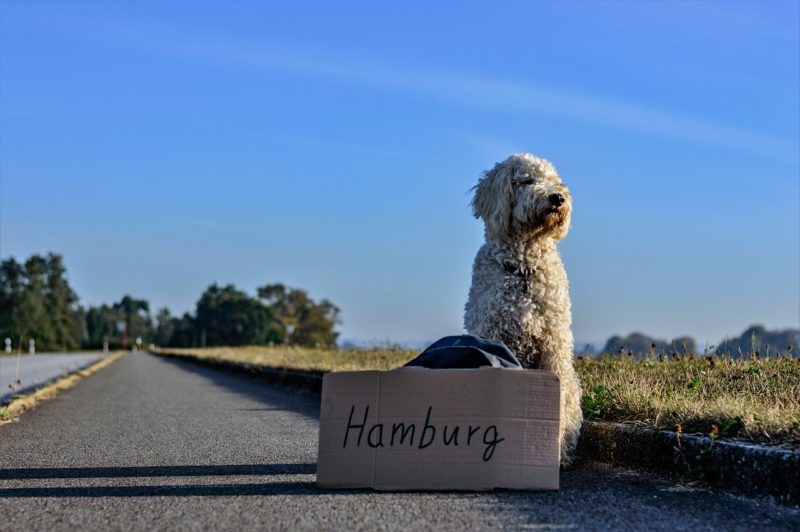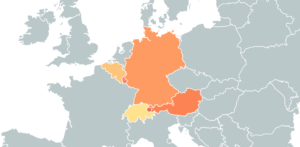Learn Common German Words and Vocabulary
When you learn a new language, you need to know the core vocabulary. Without these words, you can’t form sentences, and can’t express your ideas. But, once you add these German words to your vocabulary, you’re guaranteed to reach fluency. And if you add the right words, you’ll achieve your goals even faster. Here’s why you should focus on the most common vocabulary, and then a list of 200+ of those words in German.
Fluency Isn’t About How Many Words You Know
A lot of students try to cram in as many words as they can. They brag that they learned hundreds of new German words, and they even know the most obscure words in German. Good for them. But, this doesn’t mean they’re fluent. If they try to whip up their newfound knowledge in a real conversation, they’ll fall flat.
That’s because fluency isn’t about how many German words you know. It’s about knowing the right German words. Learning only the most common and most used German words doesn’t just make you a good conversation partner. You’ll also reach fluency much faster.
Use the 80/20 Principle to Learn Common German Words
If you don’t believe me that you should only concentrate on the most common words, hopefully, you’ll believe science. 80% of everyday German conversations comes from 20% of the total vocabulary. It’s called the Pareto Principle, or the 80/20 rule. And you can use this to reach fluency faster.
If you only learn that 20% of the German language, you can take part in 80% of the conversations. So, with only a little effort, you can have a lot of success already. But, which exact words are part of that 20%?
Well, the following list includes the most 200 common German words. That’s a great start. But, if you’re hungry for more, you can easily access the full list with the OptiLingo app. This reliable language learning method gives you pronunciation practice and a list of the most useful German vocabulary at the same time.

200+ Common German Words
You’ll definitely need these 222 German words to speak German fluently. We divided them according to their grammatical categories, so it’s even easier for you to focus on one group at a time. Of course, there are way more words in the German language. But, once you know these, speaking German will only be a matter of grammar.
List of Common German Nouns
German Nouns |
Translation |
das Beispiel, -e |
example |
das Ende, -n |
end |
das Geld |
money |
das Haus, -¨er |
house |
das Jahr, -e |
year |
das Kind, -er |
child |
das Land, -¨er |
country, land |
das Leben |
life |
das Mädchen |
girl |
das Mal, -e |
time (number of times) |
das Problem, -e |
problem |
das Prozent, -e |
percent |
das Recht, -e |
right, law |
der Abend |
evening, eve, night |
der Fall, -¨e |
fall, case |
der Freund |
friend |
der Herr, -en |
man, gentleman, Mr. |
der Junge, -n |
boy |
der Mann, -¨er |
man |
der Mensch, -en |
human being, man |
der Tag, -e |
day |
der/das Teil, -e |
part |
die Angst |
fear, anxiety |
die Arbeit, -en |
work, job |
die Frage, -n |
question |
die Frau, -en |
woman, wife, Mrs. |
die Hand, -¨e |
hand |
die Leute |
people |
die Million (Mio.), -en |
million |
die Stadt, -¨e |
city |
die Welt, -en |
world |
die Zeit |
time |
List of the Most Common German Verbs
German Verbs |
Translation |
anrufen |
to call, phone |
arbeiten |
to work |
bleiben |
to stay, remain |
brauchen |
to need |
bringen |
to bring |
denken |
to think |
dürfen |
may, to be allowed |
finden |
to find |
geben |
to give; to put; to deal; there is/are |
gehen |
to go, walk; to leave; to work; to be in progress, last; to be going; to approach |
glauben |
to believe |
haben |
to have |
heißen |
to be called |
kommen |
to come |
können |
can, to be able to |
lassen |
to let, allow, have done |
leben |
to live |
liegen |
to lie, be lying |
machen |
to make, do, prepare; to produce; to go; to put |
müssen |
must, to have to |
nehmen |
to take |
sagen |
to say, tell |
sehen |
to see, look; to take care of; to view, watch, observe; to notice |
sein |
to be, to have, to exist, there is / it is |
sollen |
should, ought to |
stehen |
to stand |
tun |
to do |
wissen |
to know |
wollen |
to want |
werden |
to get, to become; will, to be going to; to be done (forms the passive voice) |
List of the Most Common German Adjectives
German Adejectives |
Translation |
alt |
old |
anz |
whole, all the |
deutsch |
German |
eigen |
own |
erste, -r, -s |
first |
genau |
exact |
gleich |
equal, same |
groß |
big, large, great |
gut |
good |
hoch |
high, tall |
jung |
young |
klein |
small, little |
kurz |
short |
lang |
long |
letzte, -r, -s |
last |
möglich |
possible |
neu |
new |
richtig |
right, correct |
spät |
late |
stark |
strong |
verschieden |
different, diverse |
weitere, -r, -s |
additional |
wichtig |
important |
wirklich |
real, true, natural |
besser |
better, preferably |
einfach |
easy, simple, plain; single, one-way; simply, just |
schön |
beautiful, lovely; good, great; nice; fine (adjective); well, beautifully; nicely; really (adverb) |
viel |
much, a lot |
weiß |
white (adjective) |
genug |
enough |
los |
loose, not attached, rid of |
List of Common German Adverbs
German Adverbs |
Translation |
also |
so, therefore |
auch |
also, too, as well |
da |
there |
dabei |
there, here, then, so (adverb); since, as, given that (conjunction) |
dafür |
for this |
dann |
then, after that |
davon |
from that |
doch |
but, still |
dort |
there |
eben |
just now |
eigentlich |
actually |
erst |
first, only, not until |
gar |
at all |
heute |
today, nowadays |
hier |
here |
immer |
always |
jetzt |
now; yet |
mehr |
more |
natürlich |
naturally, of course |
nicht |
not |
nie |
never |
noch |
still, yet |
nun, nu |
now |
nur |
only, merely, just; |
oben |
above, up there |
schon |
already |
sehr |
very |
so |
so, thus, this way, such |
vielleicht |
perhaps, maybe |
warum |
why |
weit |
widely, far |
wieder |
again |
zurück |
back, backwards |
ganz |
all, all the, every, everything, everybody, everyone |
gerade |
just |
aber |
again (adverb); but, though (conjunction) |
damit |
with it, thereby; so that, in order that |
wo |
where, somewhere; when |
wie |
how (adverb); like, as (conjunction) |
ja |
yes; really, definitely; of course (adverb); a yes (capitalized as a noun – Ja) |
nein |
no; a no |
Common German Conjunctions to Make Sentences
German Conjunctions |
Translation |
als |
than, when, as, while, as if |
bevor |
before |
beziehungsweise |
or, respectively |
dass |
that |
denn |
because |
entweder…oder |
either…or |
falls |
in case, if |
indem |
while, by |
nachdem |
after |
ob |
whether |
obwohl |
although |
oder |
or |
so dass |
so that |
sobald |
as soon as |
solange |
as long as |
sondern |
but (rather) |
sowie |
as well as |
sowohl … und |
both |
und |
and |
weder noch |
neither … nor |
weil |
because |
wenn |
if, when, whenever |
zumal |
particularly, especially |
List of the Most Common German Pronouns
German Pronouns |
Translation |
diese |
this, these |
ein |
a, an |
andere |
other, different, next |
kein |
no, not a, not an; |
man |
one, they, you |
nichts |
nothing |
all |
all, all the, every, everything, everybody, everyone |
etwas |
some, something, any (pronoun); somewhat, slightly, a little, a bit (adverb); something (capitalized as a noun – Etwas) |
ach |
oh! |
bitte |
please, you’re welcome, excuse me, please do, go ahead; request, plea (capitalized as a noun – die Bitte); to ask (inflection of the verb “bitten”) |
danke |
thank you!, thanks!; inflection of the verb “danken” |
was |
what (interrogative); which (relative) |
wer |
who; the person who; somebody, someone |
German Personal and Reflexive Pronouns
German Pronouns |
Translation |
du |
you (informal, singular) |
er |
he, it |
es |
it |
euch |
you, yourselves (plural ) |
ihm |
him, to him |
ihn |
him, it |
ihnen |
them, to them |
mir |
me, to me |
Sie |
you (polite, singular or plural) |
sie |
she, it; they, you |
wir |
we |
ihr |
you, you all (plural, informal); her, to her ; her, its, their |
dich |
you; yourself |
dir |
you, to you; yourself, to yourself |
uns |
us; ourselves |
mich |
me, myself |
ich |
I (not capitalized); ego (capitalized – Ich) |
deine |
your |
ihre |
hers, its, theirs |
Ihre |
yours (singular and plural) |
mein |
my |
am |
on, at, on the, at the |
an |
to, on, at, by, about, against |
List of Common German Prepositions
German Prepositions |
Translation |
am |
on, at, on the, at the |
an |
to, on, at, by, about, against |
auf |
on, onto, at |
aus |
out of, from |
bei |
by, near, with, at |
durch |
through, by means of |
für |
for |
gegen |
against |
gegenüber |
across from |
hinter |
behind, in back of |
im |
in the |
in |
in |
in |
in, within, at, pertaining to |
ins |
to the, into the |
mit |
with |
nach |
after, to, toward |
neben |
beside, next to |
ohne |
without |
seit |
since, for a period of time |
über |
above, over, about |
um |
around, at |
unter |
under |
von |
from, of |
vor |
in front of, before, ago |
während |
during |
wegen |
because of |
zu |
to, at |
zwischen |
between |
ab |
from, as of (preposition); off, away (adverb) |
bis |
to |
sich |
oneself, itself, himself, herself, themselves |
How to Learn This List of Common German Words
Now you’ve got 222 German words. That’s great, but what’s next? Well, you need to learn them. Having them here, or even on a piece of paper won’t make this knowledge yours. So, how can you learn these German words fast and effectively? Here are a few tricks you can use to commit them to your long term memory effortlessly:
- Don’t cram! Let’s start off with what not to do. Never, under any circumstances, try to cram German vocabulary. Forcing yourself to remember a lot in a short time only leads to two things: you’ll hate your lessons and you won’t actually commit them to your long term memory. Try one of the following techniques instead:
- Try chunking: Chunking is a great memory aid. Try to divide this German vocabulary list into smaller and more manageable groups. These can be by categories or topics too. Then, you learn the groups one by one. Smaller and more achievable tasks get you to success steadily.
- Use spaced repetition: Wouldn’t it be awesome if you could hack your brain to store all this information? Well, you actually can. With spaced repetition, you can remember anything you want. It’s a simple trick that not many know about. You just periodically review this list of German words. Every time you come back to read these, you’ll reinforce your German knowledge. Soon, you can recall all 222 of these German words effortlessly.
- Write it all down: Handwriting is linked to tactile learning. If you write these words down by hand you’ll remember them better.
- Say them out loud: The only way to reach fluency is by speaking a lot. Practice your German pronunciation. The more you say these German words, the more it sticks to your memory. And you’ll also get more comfortable with the language.
Learn Even More Common German Words
222 common German words is a lot. But, there’s a lot more to a full German vocabulary than that. If you want to learn all the most useful German words and phrases, you need to use OptiLingo.
OptiLingo is the app that gets you to fluency. It gives you all the best German vocabulary, for sure. But, it also makes you speak the language. It builds your confidence and shows you exactly how the locals speak. Achieve German learning success when you download OptiLingo!














